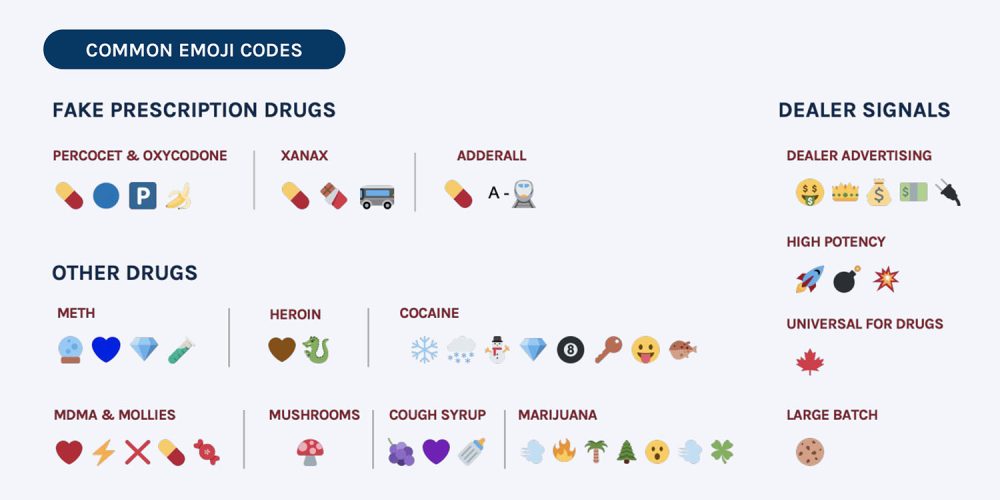Police report seeing increasing evidence of drug deals via apps like Snapchat, Instagram, and TikTok – and say that this is one of the factors behind soaring drug fatalities though fentanyl-tainted pills.
Emoji are used as code for different drugs, deals struck in private messages, and apps like Venmo and Cash App used for payment …
Background
Fentanyl is a powerful opioid pain-killer, which is increasingly used as a recreational drug, and can prove fatal when misused either alone or mixed with other drugs. It was recently reported that a growing number of deaths result from fentanyl being mixed with other controlled substances.
After a catastrophic increase in 2020, deaths from drug overdoses rose again to record-breaking levels in 2021, nearing 108,000, the result of an ever-worsening fentanyl crisis, according to preliminary new data published on Wednesday by the Centers for Disease Control and Prevention […]
A growing share of deaths continue to come from overdoses involving fentanyl, a class of potent synthetic opioids that are often mixed with other drugs […]
Because fentanyl is a white powder, it can be easily combined with other drugs, including opioids like heroin, and stimulants like meth and cocaine, and can be stamped into counterfeit pills for anti-anxiety drugs like Xanax. Such mixtures can prove lethal if drug users are unaware they are taking fentanyl or are unsure of the dose.
Drug deals via apps
A NY Times report says that social media apps are now the primary way teenagers and young adults buy illegal drugs. Dealers create profiles containing enough clues to be recognized by their target market, and the deals are done in private messages.
Shortly after Kade Webb, 20, collapsed and died in a bathroom at a Safeway Market in Roseville, Calif., in December, the police opened his phone and went straight to his social media apps. There, they found exactly what they feared.
Mr. Webb, a laid-back snowboarder and skateboarder who, with the imminent birth of his first child, had become despondent over his pandemic-dimmed finances, bought Percocet, a prescription opioid, through a dealer on Snapchat. It turned out to be spiked with a lethal amount of fentanyl.
Mr. Webb’s death was one of nearly 108,000 drug fatalities in the United States last year, a record, according to preliminary numbers released this month by the Centers for Disease Control and Prevention. Law enforcement authorities say an alarming portion of them unfolded the same way as his: from counterfeit pills tainted with fentanyl that teenagers and young adults bought over social media.
“Social media is almost exclusively the way they get the pills,” said Morgan Gire, district attorney for Placer County, Calif., where 40 people died from fentanyl poisoning last year. He has filed murder charges against a 20-year-old man accused of being Mr. Webb’s dealer, who pleaded not guilty. “About 90 percent of the pills that you’re buying from a dealer on social media now are fentanyl,” Mr. Gire said.
Emoji are one of the key clues used to signal the availability of drugs without alerting moderators and law enforcement. Posts are made, and then quickly deleted once people respond.

The US Drug Enforcement Administration (DEA) is running a public awareness campaign One Pill Can Kill.
“Drug traffickers advertise on social media platforms like Facebook, Instagram, Snapchat, TikTok, Twitter and YouTube. These advertisements are in disappearing, 24-hour stories and in posts,
which are promptly posted and removed. Posts and stories are often accompanied by known code words and emojis that are used to market and sell illicit and deadly drugs on social media. These code words and emojis are designed to evade detection by law enforcement and by the preset algorithms used by social media platforms.
Prospective buyers contact drug traffickers on social media apps in response to their advertisements – either using direct messaging or by commenting on a post. Once contact is made, drug traffickers and potential buyers often move to an encrypted communications app like WhatsApp, Signal, and Telegram. Drug traffickers typically switch to these encrypted communications apps to arrange drug deals with prospective buyers.
After a deal is made, drug traffickers request payment using one-click apps like Venmo, Zelle, Cash App, and Remitly.”
FTC: We use income earning auto affiliate links. More.



Comments